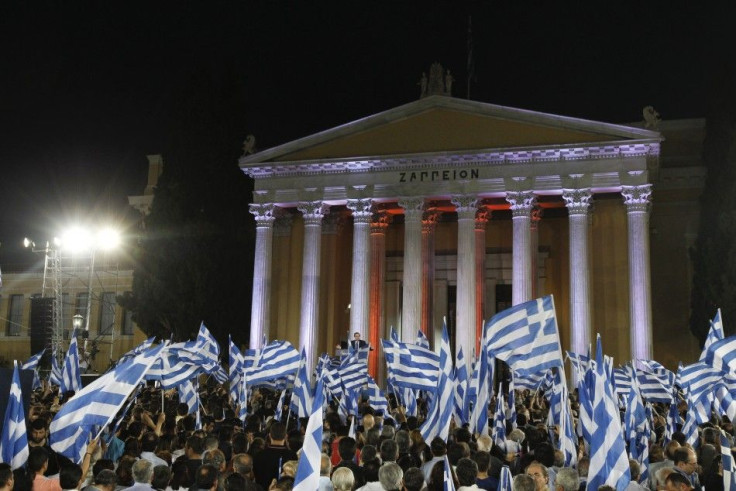Greek Election: With No Party Enjoying Majority, Fractured Coalition Government Likely

While much attention will be focused this weekend on the presidential poll in France, 1,300 miles away another crucial election is taking place in crisis-ridden Greece.
Unlike in France, however, where voters will choose between two distinct candidates -- conservative Nicolas Sarkozy and Socialist Francois Hollande -- the Greek election is more complicated.
Evangelos Venizelos, the leader of the Socialist PASOK party, who was the former finance minister and is committed to imposing tough austerity measures in exchange for a huge bailout from the European Union, will likely have to form an uneasy union with Antonis Samaras, the head of the conservative New Democracy (ND) party, who's leading in polls.
Although the alliance would be uncomfortable for both men, it could be necessary, given the large number of parties running and the lack of a majority consensus for any one party.
Samaras has only expressed mild support for the austerity push, while virtually every other smaller political party across the ideological spectrum, is virulently opposed to spending cuts and submitting to the demands of the EU.
Samaras actually voted against the first bailout Greece ultimately received, and only supported the second payment with great reluctance.
Greece needs a strong medicine but the one administered was the wrong one because it did not allow for any recovery, Samaras told Reuters earlier this year.
What we need to do now is reduce tax rates and implement structural changes so as to speed up deficit cutting and recovery.
Samaras has been appealing to the far right by expressing his virulent opposition to illegal immigration – a move that's likely to cost him some centrist voters.
Samaras is leading in the polls, with up to 26 percent of the vote -- enough to win the election, but hardly enough to form a new government without a coalition with PASOK -- which has at the most 19 percent of the electorate on its side.
These numbers suggest the ND and PASOK combined couldn't amass even half the vote total -- suggesting a significant presence of smaller parties.
A third party, Coalition of the Radical Left, or Syriza, is hoping to siphon off a lot of votes from the Socialist party and come in third in the poll. Other smaller parties vying for seats include the Communist Party (KKE), the Democratic Left; and two extreme right-wing parties, Popular Orthodox Rally (LAOS) and Golden Dawn.
The ND and PASOK may have to form an alliance with one of the aforementioned smaller parties; however, at least one such party, the Democratic Left, has already ruled that out.
Fotis Kouvelis, the leader of the Democratic Left, told a rally on Friday that the party won't take part in the New Democracy-PASOK coalition, as is being suggested. We will not give a democratic, left alibi to this coalition, which some are promoting.”
In the event the ND receives a much higher mandate from the public, then Samaras wouldn't need to form any alliance or coalition -- although such a scenario seems highly unlikely.
“Whatever you have voted in the past, it doesn’t matter,” Samaras told thousands of supporters at an Athens rally. “I will be a prime minister for all of you. I will fight for each one of you, with all my strength, day and night.”
Interestingly, Samaras has refused to speak to the media during the campaign, and he has also rejected participating in a TV debate with Venizelos.
Public appearances by politicians in Greece are fraught with danger. The Ekathimerini newspaper of Athens reported that over the past two years, dozens of politicians and public figures have been physically assaulted by people who are fed up with high unemployment, salary cuts and vanishing social programs.
Under Greek election laws, campaigning will end on Friday night and no electioneering will be permitted on Saturday. Polls will close at 7 p.m. on Sunday.
© Copyright IBTimes 2024. All rights reserved.




















